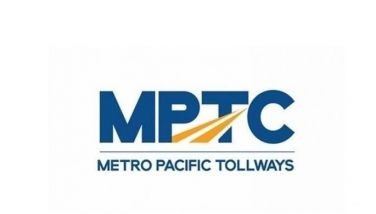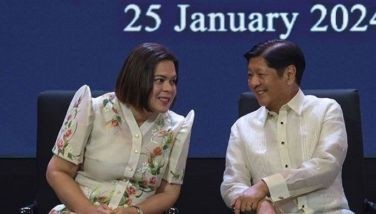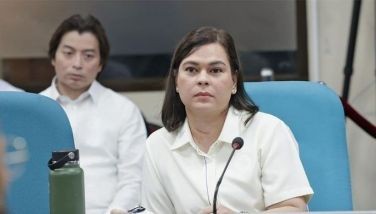GSIS, SSS buck postponement of Equitable PCI Bank meeting
July 16, 2005 | 12:00am
The Government Service Insurance System (GSIS) and the Social Security System (SSS) will object to any attempt to postpone the crucial July 19 stockholders’ meeting of Equitable PCIBank in Makati.
The two state pension funds have a combined equity holdings of more than 40 percent in the bank, with SSS owning 39 percent and GSIS, 12.7 percent. Their total shares constitute more than one-third of the bank’s total outstanding stock.
"We must be consulted first if they want a postponement, then we can exercise our right to demand a continuation of the July 19 meeting or call a special meeting," Corazon de la Paz, SSS president and chief executive officer, said.
Under the corporation’s by-laws, stockholders representing at least one third of the issued capital stock can call a special shareholders’ meeting.
"We have to cover our backs," De la Paz added.
The two government financial institutions also expressed concern over the actions taken by the group of board directors identified with the Go family.
There were rumors that the faction identified with EPCI Bank chairman Antonio Go is planning to postpone the July 19 meeting in view of the rejection of the Securities and Exchange Commission (SEC) to recognize Roberto R. Romulo as an independent board member due to certain technicalities.
That order is seen to weaken the position of the Go faction in getting the majority position in the bank’s board of directors.
GSIS president and general manager Winston F. Garcia said that getting a court ruling to stop both the July 19 meeting and the special meeting would make the minority stockholders’ rights "illusory if it can be defeated by a mere notice of postponement issued by the board of directors."
Garcia had earlier lodged a criminal complaint against Go, Romulo, Anthony Conway, Peter Go Pailan and corporate secretary Nilo Divina "for conspiring to perpetuate the artificial majority of the Go family in Equitable PCI Bank by appointing Romulo as an independent director, despite prior knowledge that the latter was not qualified for the position."
Citing Section 38 of the Securities Regulation Code specifying that an independent director should be an individual who is not an officer or employee of the corporation, its parents or subsidiaries, Garcia alleged that Romulo willfully violated this provision by accepting the EPCI Bank directorship despite knowledge that he is not qualified, having been a member of the board of directors of Equicom Systems Management Inc., a joint venture between the Equitable Group and Telus International.
The Monetary Board of the Bangko Sentral ng Pilipinas (BSP) has also disqualified Roberto R. Romulo as "independent director" of the EPCI Bank, the country’s third largest bank.
The MB has determined that Romulo "does not possess the qualification of an independent director of Equitable PCI Bank," said Leny Silvestre, acting BSP director, in a letter to Rene J. Buenaventura, EPCI Bank president and chief executive officer.
The MB found that Romulo has been chairman of the board of Equitable Card Network Inc. (ECNI) from 1997 up to 2004, and is also concurrently chairman of the Equicom Systems Management Inc. (ESMI), both controlled by the Go family that also owns substantial shares in EPCI Bank.
In disqualifying Romulo as independent director, the MB ruled that he (Romulo) "is considered to be acting as representative of the Go family, a substantial shareholder of EPCI Bank."
Earlier, the Securities and Exchange Commission also declared Romulo "disqualified" as EPCI Bank director basically on the same ground used by the central bank. An SEC official said the commission is also studying the filing of criminal charges against five officials of the bank for "conspiring" to elect Romulo to the board without notifying the shareholders of his "lack of qualification."
The BSP and SEC acted on the complaint of GSIS’s Garcia who accused the Go family of packing the EPCI Bank board with "dummies" to be able to control the bank operations and management.
The two state pension funds have a combined equity holdings of more than 40 percent in the bank, with SSS owning 39 percent and GSIS, 12.7 percent. Their total shares constitute more than one-third of the bank’s total outstanding stock.
"We must be consulted first if they want a postponement, then we can exercise our right to demand a continuation of the July 19 meeting or call a special meeting," Corazon de la Paz, SSS president and chief executive officer, said.
Under the corporation’s by-laws, stockholders representing at least one third of the issued capital stock can call a special shareholders’ meeting.
"We have to cover our backs," De la Paz added.
The two government financial institutions also expressed concern over the actions taken by the group of board directors identified with the Go family.
There were rumors that the faction identified with EPCI Bank chairman Antonio Go is planning to postpone the July 19 meeting in view of the rejection of the Securities and Exchange Commission (SEC) to recognize Roberto R. Romulo as an independent board member due to certain technicalities.
That order is seen to weaken the position of the Go faction in getting the majority position in the bank’s board of directors.
GSIS president and general manager Winston F. Garcia said that getting a court ruling to stop both the July 19 meeting and the special meeting would make the minority stockholders’ rights "illusory if it can be defeated by a mere notice of postponement issued by the board of directors."
Garcia had earlier lodged a criminal complaint against Go, Romulo, Anthony Conway, Peter Go Pailan and corporate secretary Nilo Divina "for conspiring to perpetuate the artificial majority of the Go family in Equitable PCI Bank by appointing Romulo as an independent director, despite prior knowledge that the latter was not qualified for the position."
Citing Section 38 of the Securities Regulation Code specifying that an independent director should be an individual who is not an officer or employee of the corporation, its parents or subsidiaries, Garcia alleged that Romulo willfully violated this provision by accepting the EPCI Bank directorship despite knowledge that he is not qualified, having been a member of the board of directors of Equicom Systems Management Inc., a joint venture between the Equitable Group and Telus International.
The Monetary Board of the Bangko Sentral ng Pilipinas (BSP) has also disqualified Roberto R. Romulo as "independent director" of the EPCI Bank, the country’s third largest bank.
The MB has determined that Romulo "does not possess the qualification of an independent director of Equitable PCI Bank," said Leny Silvestre, acting BSP director, in a letter to Rene J. Buenaventura, EPCI Bank president and chief executive officer.
The MB found that Romulo has been chairman of the board of Equitable Card Network Inc. (ECNI) from 1997 up to 2004, and is also concurrently chairman of the Equicom Systems Management Inc. (ESMI), both controlled by the Go family that also owns substantial shares in EPCI Bank.
In disqualifying Romulo as independent director, the MB ruled that he (Romulo) "is considered to be acting as representative of the Go family, a substantial shareholder of EPCI Bank."
Earlier, the Securities and Exchange Commission also declared Romulo "disqualified" as EPCI Bank director basically on the same ground used by the central bank. An SEC official said the commission is also studying the filing of criminal charges against five officials of the bank for "conspiring" to elect Romulo to the board without notifying the shareholders of his "lack of qualification."
The BSP and SEC acted on the complaint of GSIS’s Garcia who accused the Go family of packing the EPCI Bank board with "dummies" to be able to control the bank operations and management.
BrandSpace Articles
<
>
- Latest
- Trending
Trending
Latest
Trending
Latest
Recommended































